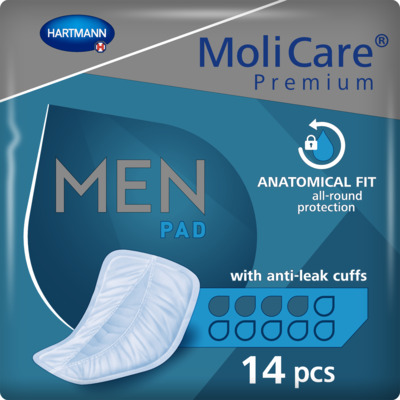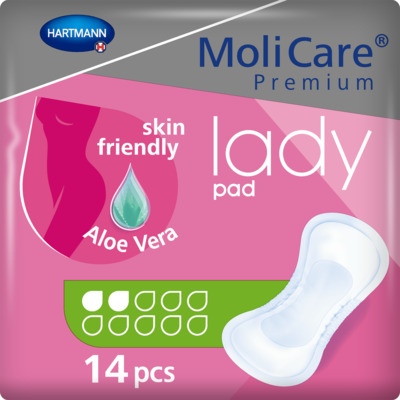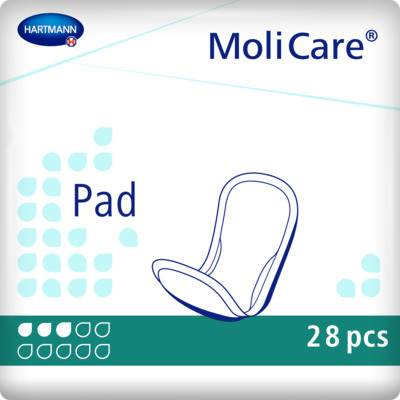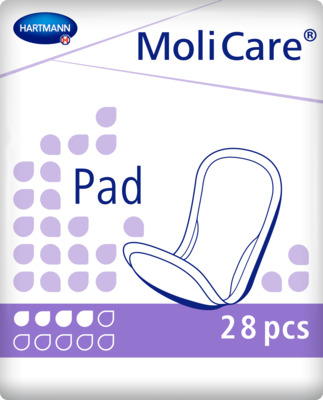Incontinence Advice
What Is Stress Incontinence?
Do you find yourself holding back a cough or laugh to avoid those small, yet embarrassing leaks? Stress incontinence can make even the simplest activities feel overwhelming, but there's no need to worry. Whether it's heavy lifting, coughing, laughing, or intimate moments, you can regain control and live life to the fullest.
Discover the secrets to successful stress incontinence management and the helpful solutions available to you. Embrace confidence and say hello to a worry-free life. Find out more now!

What Is Stress Incontinence?
Stress incontinence occurs when activities that put pressure on the bladder, such as coughing or laughing, lead to urine leakage. Of course, there are other forms of incontinence that are linked to stress.
Urgency Incontinence: Marked by a sudden, intense need to urinate, often followed by immediate leakage.
Overflow incontinence: Also known as chronic urinary retention, happens when the bladder doesn't empty completely, resulting in frequent, small leaks.
Total Incontinence: This refers to a complete inability to store urine in the bladder, leading to constant or recurrent leakage. Many individuals experience a combination of stress and urgency incontinence.
Here is our advice regarding how to stop urine leakage when coughing.
Products for women
Take a look at our incontinence products for women
Seeking Medical Help
Understanding the symptoms of stress incontinence is crucial. If you're experiencing any form of this condition, consulting a healthcare professional is strongly advised. Discussing urinary incontinence may feel uncomfortable, but it's a necessary step towards effective management.
Diagnosis typically begins with a detailed consultation with a healthcare provider, who may perform a pelvic or rectal examination and suggest maintaining a diary to track fluid intake and urination patterns. Depending on the case, referral to a specialist for further evaluation might be recommended.
Causes of Stress Incontinence:
As mentioned, stress incontinence arises due to the weakening of the pelvic floor muscles and the urinary sphincter, both crucial in supporting the urethra and controlling urine release. As the bladder fills, it enlarges, and normally, the urethra's valve-like muscles stay shut, holding urine until an appropriate time. However, weakened muscles may fail to contain urine during abdominal and pelvic pressure caused by actions like sneezing, bending, lifting, or intense laughter.
Key reasons for the pelvic floor muscles weakening could include:
- Childbirth: For women, childbirth can result in tissue or nerve damage, weakening the pelvic floor muscles or the sphincter. The onset of stress incontinence may be immediate post-delivery or emerge years later. Therefore, it's important to know about pregnancy and incontinence.
Prostate Surgery: In men, stress incontinence often stems from prostatectomy, the removal of the prostate gland, which can impair the sphincter located just beneath the prostate, encircling the urethra. Knowing about incontinence after prostate surgery and other relevant prostate problems can aid in making you more aware of this issue.
- Ongoing heavy work that places the lower abdomen under strain.
Chronic constipation associated with bearing down too hard.
- Hormonal deficiencies during menopause ( read here more about symptoms of the perimenopause).
Constitutional connective tissue weakness.
- Obesity.
- General muscle atrophy in age.
- Surgery on the lower abdomen.
Uterine or vaginal prolapse.
Contributing Factors:
Additional elements that can exacerbate stress incontinence are:
Persistent coughing due to chronic illnesses.
Obesity.
- Smoking, which can lead to chronic coughing.
- Long-term participation in high-impact activities like running and jumping.
Stress Incontinence: Severity Levels
There are three different stages of severity with stress incontinence with the loss of urine, as follows:
-
Stage 1: Caused by physical exertion, the symptoms occur with high pressure in the abdominal cavity, leading to a loss of urine, for example, when coughing, laughing or sneezing.
-
Stage 2: When losing urine occurs with ongoing stresses such as standing up, sitting down, going up stairs, walking or jumping.
-
Stage 3: When urine is lost without physical exertion, when lying or sitting down.
Symptoms of Stress Incontinence:
Those with stress incontinence might experience urine leakage during activities that increase pressure on the bladder, such as:
Coughing or sneezing.
Laughing.
Bending over.
Lifting heavy objects.
During sexual activity.
Engaging in physical exercise.
It's important to note that leakage may not occur every time these activities are performed. However, any action that pressures the bladder, especially when it is full, can increase the likelihood of involuntary urine loss. For those that are more active, you can still participate in sports with incontinence.
Risk Factors:
Several risk factors can elevate the likelihood of developing stress incontinence, including:
-
Ageing: With the increase of age, factors such as muscle weakening, may heighten the susceptibility to stress incontinence. This condition is not confined to older adults, as younger people can also experience episodes.
-
Childbirth Method: The risk of stress incontinence is notably higher in women who have undergone vaginal childbirth, particularly with the use of forceps. However, women who have had vacuum-assisted deliveries do not seem to have an increased risk compared to caesarean deliveries.
- Body Weight: Overweight or obese people face a heightened risk due to the additional pressure exerted on abdominal and pelvic organs.
- Previous Pelvic Surgeries: In women, procedures like hysterectomy, and in men, surgeries addressing prostate cancer, can weaken bladder and urethra supporting muscles, thereby elevating stress incontinence risk.
Complications Associated with Stress Incontinence:
The implications of stress incontinence extend beyond physical symptoms and include:
Emotional Impact: The discomfort and embarrassment caused by stress incontinence can profoundly affect daily life, including work, social interactions, personal relationships, and sexual activities.
Mixed Incontinence: It is common for people to experience both stress incontinence and urgency incontinence, a condition where bladder muscle contractions lead to a sudden need to urinate.
Skin Issues: Continuous contact with urine can lead to skin irritation or sores, particularly in cases of severe incontinence. Protective measures like barrier creams or incontinence products are crucial to prevent such complications. Learn more about what are barrier creams now.
How To Prevent Stress Incontinence
While stress incontinence cannot always be prevented, there are proactive steps to potentially reduce its occurrence.
These methods include:
- Sustaining a healthy body weight.
- Modifying drinking habits, such as reducing alcohol intake.
- Engaging in pelvic floor muscle strengthening exercises.
Maintaining a Healthy Weight:
Obesity is a well-known risk factor for stress and urinary incontinence. Reducing this risk may be possible through regular physical activity and a balanced diet. To determine if your weight aligns with healthy standards for your height, consider using a healthy weight calculator.
Drinking Habits:
A healthcare professional can provide personalised advice on fluid intake based on your specific bladder condition. For those with stress incontinence, it's advisable to limit alcohol and caffeine-rich beverages like tea, coffee, and cola, as they can increase urine production and irritate the bladder. The advised weekly alcohol consumption limit stands at 14 units, with one unit equating to approximately half a pint of standard strength lager or a 25ml measure of spirits. Check out our recommendations for the best bladder-friendly drinks as well as foods and drinks that irritate the bladder.
Learn more about alcohol units and their implications.
Reducing fluid intake in the evening can help with nocturnal enuresis (frequent nighttime urination), but ensure adequate hydration throughout the day.
Pelvic Floor Exercises:
Pregnancy and childbirth can weaken the muscles controlling urine flow. Pregnant women can benefit from pelvic floor exercises to prevent urinary and stress incontinence.
Strengthening pelvic floor muscles is beneficial for everyone, not just those who are pregnant. Regular pelvic floor exercises can contribute to improved bladder control.
Treating Stress Incontinence
There are several methods to treat stress incontinence, both surgical and non-surgical.
Non-Surgical Methods:
Initially, healthcare professionals may recommend exploring basic measures to mitigate symptoms. These methods include:
-
Lifestyle modifications, such as weight loss and reducing intake of caffeine and alcohol.
-
Pelvic floor muscle training, which involves strengthening these muscles through specific exercises. Here are some pelvic floor exercises for women.
-
Bladder training techniques, aimed at increasing the duration between feeling the need to urinate and the actual act of urination.
-
Additionally, the use of incontinence products like absorbent pads may be beneficial. If these methods prove insufficient, medication might be advised as a further step.
Surgical Options:
In cases where non-surgical methods are inadequate, surgery may be considered, depending on the type of incontinence. For stress incontinence, surgical options such as sling procedures are available to alleviate bladder pressure or bolster the muscles responsible for urination.
Surgical interventions for urge incontinence may involve procedures to expand the bladder's capacity or the implantation of devices that stimulate the nerves controlling the detrusor muscles, which play a crucial role in bladder function.
In conclusion, understanding and managing urinary incontinence, particularly stress incontinence, is essential for improving quality of life. Preventative measures like maintaining a healthy weight, moderating fluid intake, and strengthening pelvic floor muscles play a pivotal role in mitigating the risk of stress incontinence. By embracing these professional approved methods, you can navigate the challenges of urinary and stress incontinence with greater confidence and control, leading to a more comfortable and fulfilling life.
FAQs
What is the most common cause of stress incontinence in women?
The most common cause of stress incontinence in women is childbirth, which can lead to weakened pelvic floor muscles and nerves, affecting bladder control.
Can stress incontinence be fixed?
Yes, stress incontinence can often be improved or fixed. Treatments include lifestyle changes, pelvic floor exercises, bladder training, medications, and in some cases, surgical procedures.
What is the new treatment for stress urinary incontinence?
A relatively new treatment for stress urinary incontinence is the use of bulking agents injected into the urethra, and in some cases, innovative nerve stimulation therapies and advanced minimally invasive surgical techniques. However, the availability and appropriateness of these treatments depend on individual cases and advancements in medical technology.
Sources:
NHS. (2023) Calculate Your BMI. [online] Available at: https://www.nhs.uk/health-assessment-tools/calculate-your-body-mass-index/ [accessed 26/01/24]
Alcohol Change. (2019) Alcohol Units. [online] Available at: https://alcoholchange.org.uk/alcohol-facts/interactive-tools/check-your-drinking/alcohol-units [accessed 26/01/24]


MoliCare® Premium Men Pad 4 Drops
<h2>Comfortable and absorbent</h2> <p>Why MoliCare for men? Hers are some of the key features of the MoliCare® Premium Men Pads from Hartmann:</p> <ul> <li>Discreet and comfortable</li> <li>Fits the male physique</li> <li>3-layer absorbent core</li> <li>Fast-absorbing system</li> <li>Anti-leakage cuffs</li> <li>Odour neutralisers</li> <li>Wide adhesive strip</li> <li>Skin-friendly</li> </ul> <p>With an affordable price and great quality guarantee, you cannot regret choosing MoliCare® Premium Men Pad 4 drops, equipped with anti-leak cuffs, and 14 pieces per bag.</p> <h2>Slim and discreet under clothing</h2> <p>MoliCare® Premium MEN Pads offer reliable support for men dealing with bladder weakness. Whether it's stress incontinence or urge incontinence, these pads for men are designed to provide a discreet and quick solution on the go. Simply place the pad before applying your underwear and secure it with the adhesive strip for worry-free protection. MoliCare® Premium MEN Pads offer full coverage for men facing very light to moderate bladder weakness.</p> <h2>Leakage protection for men</h2> <p>MoliCare® understands that each individual's incontinence needs are unique. That's why our incontinence products, including MoliCare® Premium MEN Pads, are available in different absorbency levels. You can find the perfect fit and protection for your specific requirements.</p> <h2>Reliable and soft on the skin</h2> <p>Our body-shaped absorbent pads are designed to deliver dependable and skin-friendly incontinence protection every day. Experience discreet comfort with the soft, cotton-like materials and the added benefit of an odour neutraliser, ensuring you feel fresh and confident throughout the day.</p> <h2>Fast delivery to your home</h2> <p>At HARTMANN Direct, we ensure a fast delivery service for all our products. Enjoy free delivery on orders over £50, making it convenient and hassle-free to receive the incontinence products you need. Our dedicated customer care team is here to discuss your incontinence product needs and answer any questions you may have. Call us today on 0800 028 9470 to experience the comfort and confidence that MoliCare® Premium MEN Pads can provide.</p>
MoliCare® Premium Lady Pad 2 Drops
<h2>Skin Friendly Pant Liners</h2> <p>For women that experience slight incontinence and bladder weakness, across different age groups, it can be a challenge to find the right bladder weakness product that is easy to apply and wear without the worry of potential leakages. Fortunately, we understand this approach, hence why we are happy to offer our MoliCare® Premium Lady Pad 2 drops, that is skin-friendly, Aloe Vera applied, and comes with 14 liners per bag.</p> <h2>Slim and discreet liners</h2> <p>Whether dealing with stress incontinence or urge incontinence, these panty liners offer a discreet and easy solution on the go. Simply place the pad in your underwear and secure it with the adhesive strip for all-round protection. Available in different absorbency levels, MoliCare® bladder weakness products cater to all levels of bladder weakness, ensuring secure care.</p> <h2>Control Bladder Weakness</h2> <p>Enjoy the benefits of these body-shaped absorbent panty liners, designed for women with bladder weakness. The pads offer discreet, reliable protection with features including odour control and fast absorption.</p> <p>With a wide adhesive strip, you can comfortably fix the pad in your regular underwear, providing secure and comfortable fixation. The pads are skin-friendly, featuring soft, breathable materials, including foam cuffs, and a top sheet treated with Aloe Vera.</p> <p>Keeping your skin healthy is a priority, which is why MoliCare® Premium Lady Pads have a skin-neutral pH value of 5.5 and an antibacterial finish. They are also dermatologically tested, offering peace of mind.</p> <h2>Buy pant liners online</h2> <p>Never worry about running out with our convenient order service and fast delivery direct to your door. Enjoy free shipping on orders over £50.</p> <p>If you need assistance, our professional customer service team is here to support you in choosing the right product. Reach out to us today at 0800 028 9470 and experience the comfort and reliability of MoliCare® Premium Lady Pads.</p>
MoliCare Pad 3 Drops
<h2>Incontinence pads for men and women</h2> <p>Protect yourself against slight bladder weakness with the MoliCare® Pad 3 drops. Suitable for men and women, offering an ideal solution to regain control and live your active life without interruptions. Slimline, discreet, and contoured to fit your body, these incontinence pads ensure a comfortable and barely noticeable feel, providing exceptional dryness and protection for slight incontinence.</p> <p>Crafted with soft, skin-friendly fabric and a polyester backsheet, these incontinence pads ensure you can confidently go about your day, secure against minor leaks. The wide adhesive fixing strip keeps the pad securely in place, while the super absorbent core wicks moisture away from your skin. The elastic anti-leak edging adds an extra layer of reassurance, and odour neutraliser keeps you feeling fresh and confident. With the MoliCare® Pad 3 drops, you no longer need to let slight or occasional incontinence hold you back from enjoying life to the fullest. Simply adhere the pad to your underwear, and you will barely feel the difference.</p> <h2>Price match promise</h2> <p>Experience convenience with our fast delivery service, bringing your chosen products directly to your door. At HARTMANN Direct, we offer a price match promise and free delivery for orders over £50, making sure you receive both quality and value.</p> <p>If you need further assistance, our customer care team is here to help. Give us a call today at 0800 028 9470, and we'll find the perfect incontinence product tailored to your needs. Take charge of your life with the reliable and comfortable protection of MoliCare® Pad 3 drops. Say goodbye to worries and hello to an active and confident lifestyle.</p>
